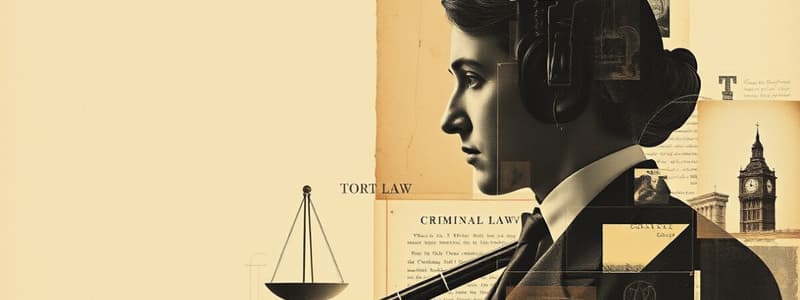Podcast
Questions and Answers
What is the primary focus of Criminal Law?
What is the primary focus of Criminal Law?
- To compensate victims
- To provide legal advice
- To punish the offender (correct)
- To create new laws
Civil Law is primarily concerned with punitive measures against wrongdoers.
Civil Law is primarily concerned with punitive measures against wrongdoers.
False (B)
What is the role of Tort Law?
What is the role of Tort Law?
To enable victims to obtain compensation for loss.
In Tort Law, intentional wrongs include assault and __________.
In Tort Law, intentional wrongs include assault and __________.
Which type of tort results from careless or negligent conduct?
Which type of tort results from careless or negligent conduct?
Statute Law can supersede or amend Common Law.
Statute Law can supersede or amend Common Law.
In what province in Canada does Common Law not apply?
In what province in Canada does Common Law not apply?
What is the primary focus of the Forgetting Curve?
What is the primary focus of the Forgetting Curve?
The forgetting curve was developed by Hermann Ebbinghaus.
The forgetting curve was developed by Hermann Ebbinghaus.
What should students do at home according to the course expectations?
What should students do at home according to the course expectations?
In Canada, individuals have a legal right to personal __________.
In Canada, individuals have a legal right to personal __________.
Which of the following is NOT a legal right of Canadians?
Which of the following is NOT a legal right of Canadians?
An act of tort can result in imprisonment for the tortfeasor.
An act of tort can result in imprisonment for the tortfeasor.
What is one example of a criminal act mentioned in the content?
What is one example of a criminal act mentioned in the content?
What is meant by strict liability?
What is meant by strict liability?
Occupiers of property are not responsible for injuries caused by the condition of their premises.
Occupiers of property are not responsible for injuries caused by the condition of their premises.
Name one type of activity that imposes strict liability.
Name one type of activity that imposes strict liability.
Under common law, individuals performing _____ work may be held strictly liable for damages.
Under common law, individuals performing _____ work may be held strictly liable for damages.
Which of the following is NOT a type of liability exposure mentioned?
Which of the following is NOT a type of liability exposure mentioned?
Under statute law, a person may face imprisonment or fines for breaching strict liability.
Under statute law, a person may face imprisonment or fines for breaching strict liability.
What is the rationale behind strict liability?
What is the rationale behind strict liability?
What was the main issue in the Donoghue vs. Stevenson case in 1932?
What was the main issue in the Donoghue vs. Stevenson case in 1932?
Sellers are considered experts regarding the properties of the articles they sell.
Sellers are considered experts regarding the properties of the articles they sell.
What is one duty of manufacturers regarding product defects?
What is one duty of manufacturers regarding product defects?
Completed operations liability claims can arise when a defect causes harm that occurred ______ from the premises of the business.
Completed operations liability claims can arise when a defect causes harm that occurred ______ from the premises of the business.
Which of the following is NOT a basis for claims arising from completed operations?
Which of the following is NOT a basis for claims arising from completed operations?
In the Donoghue vs. Stevenson case, the shopkeeper was found to be negligent.
In the Donoghue vs. Stevenson case, the shopkeeper was found to be negligent.
What is one responsibility of sellers when marketing their products?
What is one responsibility of sellers when marketing their products?
What does contractual liability refer to?
What does contractual liability refer to?
Pollution liability exposure refers to personal injuries caused by environmental contaminants.
Pollution liability exposure refers to personal injuries caused by environmental contaminants.
Name one type of business that may require incidental medical malpractice insurance.
Name one type of business that may require incidental medical malpractice insurance.
Civil law encompasses various legal frameworks, including __________ law.
Civil law encompasses various legal frameworks, including __________ law.
Which of the following is an example of special damages?
Which of the following is an example of special damages?
Nominal damages are awarded only when there is a breach of contract without financial loss.
Nominal damages are awarded only when there is a breach of contract without financial loss.
What is the definition of strict liability?
What is the definition of strict liability?
Flashcards
Virtual Classroom
Virtual Classroom
Online learning environment with audio tools, polls, quizzes, and interactive features.
Student Portal
Student Portal
Online access point for course materials, assessments, and help resources.
Forgetting Curve
Forgetting Curve
Memory decline over time, requiring review to retain information.
Spaced Repetition
Spaced Repetition
Signup and view all the flashcards
Criminal Liability
Criminal Liability
Signup and view all the flashcards
Civil Law
Civil Law
Signup and view all the flashcards
Tort Law
Tort Law
Signup and view all the flashcards
Contract Law
Contract Law
Signup and view all the flashcards
Common Law
Common Law
Signup and view all the flashcards
Statute Law
Statute Law
Signup and view all the flashcards
Strict Liability
Strict Liability
Signup and view all the flashcards
Negligence
Negligence
Signup and view all the flashcards
General Damages
General Damages
Signup and view all the flashcards
Special Damages
Special Damages
Signup and view all the flashcards
Completed Operations Liability
Completed Operations Liability
Signup and view all the flashcards
Personal Injury Liability
Personal Injury Liability
Signup and view all the flashcards
Manufacturer's Duty
Manufacturer's Duty
Signup and view all the flashcards
Seller's Duty
Seller's Duty
Signup and view all the flashcards
Occupier's Liability
Occupier's Liability
Signup and view all the flashcards
Breach of Contract
Breach of Contract
Signup and view all the flashcards
Study Notes
The Virtual Classroom
- Engage using audio tools and test functionalities, such as raising hands and accessing materials.
- Participate in polls and quizzes for a deeper learning experience.
- Utilize breaks effectively for better focus and retention.
- Always ask questions, whether audibly or via chat for clarification and understanding.
The Student Portal
- Sign in to access various resources, including tutorials and help links.
- Familiarize with quizzes, midterm, and practice final assessments.
- Use graphic organizers to visually arrange complex information.
The Forgetting Curve
- Concept introduced by Hermann Ebbinghaus, illustrating the decline of memory retention over time.
- Active review and study are essential to combat memory loss; spaced repetition improves retention.
- Plan exam schedules with the forgetting curve in mind; greater intervals can lead to more forgetting.
Course Expectations
- Students should articulate personal expectations and previous studying experiences in chat discussions.
- Emphasis on personal responsibility for learning through continuous review and inquiry outside class.
Criminal Liability
- Distinctions between criminal law (harmful to the state) and civil law (compensating victims).
- Legal rights in Canada include equality, privacy, property rights, and protection from physical harm.
- Criminal law focuses on punishment and agency of the state, while civil law centers on victim compensation.
Tort Law and Contract Law
- Tort defined as a civil wrong, enabling victims to seek damages.
- Categories of tort: intentional (e.g., assault) and unintentional (e.g., negligence).
- Breach of contract involves failure to fulfill contractual obligations, leading to legal remedies.
The Law - Establishment
- Common Law operates through judge-made law, emphasizing past decisions (precedents).
- Statute Law consists of legislated, written laws implemented by government bodies, superseding common law.
Commercial and Business Liability Exposure
- Strict liability imposes accountability without needing proof of negligence.
- Occupiers of land/businesses are liable for injuries on their premises, considering both conditions and operations.
Duties in Commercial Contexts
- Manufacturers must ensure product safety, or they may be liable for defects.
- Sellers are expected to provide truthful representations regarding their products.
Types of Liability Exposure
- Completed operations liability arises when work performed by a business causes damage after completion.
- Personal injury liability concerns claims that arise from business operations affecting public safety.
Key Terms
- Civil Law: Focuses on compensating victims for private wrongs.
- Tort: Civil wrong causing harm leading to a legal remedy.
- Statute Law: Legislation created by government bodies.
- Negligence: Failure to exercise appropriate care leading to damage.
- Strict Liability: Accountability without intent or negligence required.
Understanding Damages
- General vs. Special Damages:
- General damages compensate for non-economic losses (e.g., pain and suffering).
- Special damages refer to quantifiable expenses (e.g., medical bills).
Studying That Suits You
Use AI to generate personalized quizzes and flashcards to suit your learning preferences.




